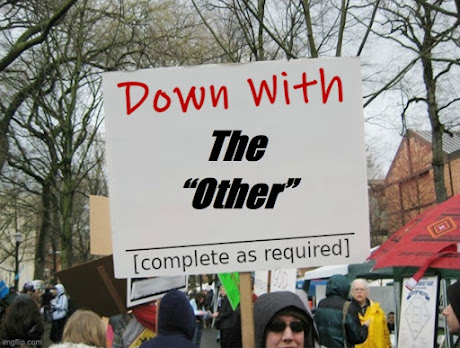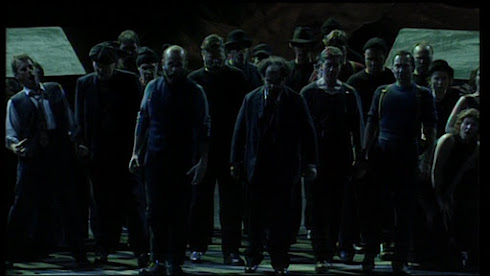Down With... The "Other"
I originally conceived this series of films because I have been concerned by what appears to be an epidemic of intolerance and "tribalism" taking hold in modern social discourse. What I wanted to show (and what I hope has become apparent from my selection of films) is just how depressingly familiar all of this actually is.
Whether it was the American Congress going after an imagined Communist threat or New England Puritans going after imagined Witchcraft; Turn-of-the-Century reactionaries going after The Cult of the Clitoris (I never get tired of that one) or modern Conservatives going after Satanic Paedophiles, there never seems to be a shortage of historical examples of "othering".
A Monty Python sketch famously told us that "No one expects the Spanish Inquisition" but the truth (and indeed the punchline of the sketch) is that you can always expect a Spanish Inquisition.
As long as there are people who believe they can enforce their moral codes on everyone else, this phenomenon is going to continue. It may be called Cancel Culture or the Spanish Inquisition or the Hollywood Blacklist, but all of it flows from the same source, and all of it stems from an unshakeable conviction that we are right, and they are wrong.
In 1941, the composer Benjamin Britten and the writer W.H. Auden collaborated on a very unusual stage work based on the story of Paul Bunyan. It was almost universally disliked at the time (and Britten disowned the work shortly after its premiere) but it stands today as a curious exploration of the American Dream. (That's one of the reasons it was disliked; no one in 1940s America was particularly receptive to a civics lesson on American Identity politics from a pair of homosexual British conscientious objectors - speaking of "othering"...)
Towards the end of the work, the chorus makes the following observation about contemporary society:
From a Pressure Group that says "I am the Constitution,"
From those who say Patriotism and mean Persecution,
From a Tolerance that is really inertia and disillusion...
(actually, this observation is made by two cats and a dog, but that's not important right now)
It is Benjamin Britten who is going to have the last word in our examination of Cancel Culture, because Benjamin Britten wrote what may quite possibly be the definitive work on the subject.
Peter Grimes is not only considered Britten's first opera (Paul Bunyan is not quite an opera, not quite a musical, and in any event was disowned by its composer) it is also considered by many to be the first British operatic masterpiece of the modern era. Lord Harewood (the director of the Royal Opera House) called it "the first genuinely successful British opera, Gilbert and Sullivan apart, since Purcell."
First performed in 1945, Peter Grimes is loosely adapted from a portion of George Crabbe's long narrative poem The Borough; inspired by fishing communities near Britten's home town of Aldeburgh, in Suffolk.
In Crabbe's poem, the character of Peter Grimes is a villain and a monster, but Britten's Peter Grimes is something quite different. He is a complex character who is systematically shunned by the rest of the community - in increasingly violent terms.
Peter Grimes the opera is many things. It is one of the great operas of the Twentieth Century. It is a uniquely British work; capturing many aspects of British life that had never been seen on an operatic stage before this.
But it is also a devastating study of Cancel Culture.
As a gay man, Britten knew what it felt like to be on the outside looking in, and Peter Grimes - almost more than any other opera - captures the feeling of an entire community focussing the full weight of its hatred on one single individual.
Pervious films in our series have looked at ostracism, persecution, lynchings and architecture, but Peter Grimes does something that only an opera can do: it allows the audience to share the experience of being cancelled by the community one thinks of as home.
Modern films about the Zombie Apocalypse can only dream of matching the sheer visceral horror of certain moments in this opera.
We will screen Peter Grimes at 7.30pm on Thursday, the 8th of June, at the Victoria Park Baptist Church.
















Comments
Post a Comment